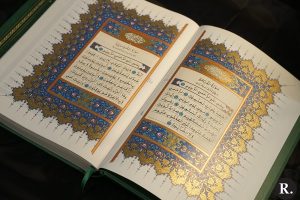
Qasim Choudhary, USA
At the insistence of a friend, I downloaded Strava on my smartphone, an app that tracks all your physical exercise and movement. I was now officially a member of the quantified self-movement, a community of those who use technology to track aspects of their daily life and performance. To my surprise, there was something oddly exhilarating about tracking and analysing my daily walks. In fact, in moments when I’d rather be melting on my couch, I would suddenly get a jolt of motivation to go on a quick walk so as to not break my daily streak. Now, I’m not claiming tracking every aspect of life is for everyone as it is a big commitment and tiresome at times. But there is no denying a business school truism that reads, ‘we manage what we monitor.’[1]
According to author Gretchen Rubin, ‘self-measurement brings self-awareness, and self-awareness strengthens our self-control.’[2] Likewise, the Promised Messiah (as) succinctly stated, ‘the more one ponders, the more insight he accumulates.’[3]
As we experience the month of Ramadan, I am curious to see how I can track my spiritual steps towards Almighty God. How do I self-measure my spiritual growth? After self-reflection, it struck me that Almighty God, in His infinite wisdom, shaped Ramadan in such a manner that self-analysis is woven within its framework.
The Holy Qur’an

For instance, in the holy month of Ramadan, Muslims strive to complete at least one reading of the Holy Qur’an. The Holy Qur’an consists of 30 parts and typically Ramadan lasts for 30 days. In this way, it is a simple task to monitor and precisely schedule how much daily recitation is required to complete the Holy Qur’an. Not only this, but Muslims are also encouraged to deliberate over the teachings of the Qur’an and assess themselves against it. Commenting on this, the Promised Messiah (as) declared, ‘our community ought to become absorbed with heart and soul in studying and reflecting on the Holy Quran.’[4]
Salat (Daily Prayers)

Prayer is the foremost method of self-reflection that carries man to the heights of spiritual enlightenment. Whether it’s the five daily obligatory prayers or the Tahajjud prayer [voluntary night prayer] we seek to offer them with consistency and mindfulness. If we are being honest, however, some people struggle with the Tahajjud and fajr [prayer before dawn] prayers. But what makes Ramadan special is that it provides us a spiritually charged environment that gives us the jumpstart we need to offer these prayers with more vigour. In fact, the holy month of Ramadan also affords ease in worship with the introduction of the Tarawih prayer. Muslims all over the world occupy mosques in droves to offer the Tarawih prayer which are congregational voluntary prayers offered right after Isha [the evening prayer]. It isn’t uncommon for someone to set a personal target for the amount of days they offered the Tarawih prayer.
When Ramadan is over, we may look back and surprise ourselves that we were able to offer the obligatory prayers and voluntary prayers with more regularity. This will only fortify our resolve to continue the good works and habits we picked up during Ramadan.
Fasting

Fasting is one of Ramadan’s hallmark spiritual exercises that attracts the grace of God Almighty. In the initial stages of Ramadan, we may feel the pangs of hunger and thirst but after a few days, the starvation begins to subside. Many of us may feel ‘hey this isn’t too bad, I got this’ and day by day our self-control increases. But the most notable effect of fasting is that it sharpens and refines our spiritual faculties. As the Promised Messiah (as) beautifully expounds, ‘Fasting is not merely staying hungry and thirsty; rather, its reality and its impact can only be gained through experience. It is human nature that the less one eats, the more one’s spirit is purified and thus, one’s capacity for [spiritual] visions increases.’[5]
Ultimately, Ramadan grants unparalleled insight of the fact that the spiritual nourishment it affords far exceeds the limited pleasure of any physical nourishment. Ramadan seeds the epiphany in our minds that we need not overeat and overindulge in our regular routine either, but as we focus on our spiritual growth, we should also reflect on the fact that the hunger we endure for a month is the involuntary reality of many throughout the year. In this way, not only do we analyse our spiritual growth, but to that end we also consider what more we can do to become better servants of humanity at large. This is how Ramadan is a mirror that shows us our true potential and abilities.
As we pass through the month Ramadan, it’s time to press the record button on our spiritual pedometers and track our spiritual journey. Remember, this journey doesn’t stop after 30 days but continues for a lifetime. So do your spiritual warmups and Strava [to strive in Swedish] on your spiritual marathon.
About the Author: Qasim Choudhary is a graduate of the Ahmadiyya Institute of Languages and Theology in Canada, and serves as an Imam of the Ahmadiyya Muslim Community in the United States of America.
ENDNOTES
[1] Rubin, G. (2015). Better than before: Mastering the habits of our everyday lives. Crown Publishers. Pg.45
[2] Ibid
[3] Malfuzat, Vol.10, pg.506 [Eng.Translation]
[4] Malfuzat, Vol.3, pg.10 [Eng.Translation]
[5] Malfuzat, Vol. 5, p. 102




Add Comment